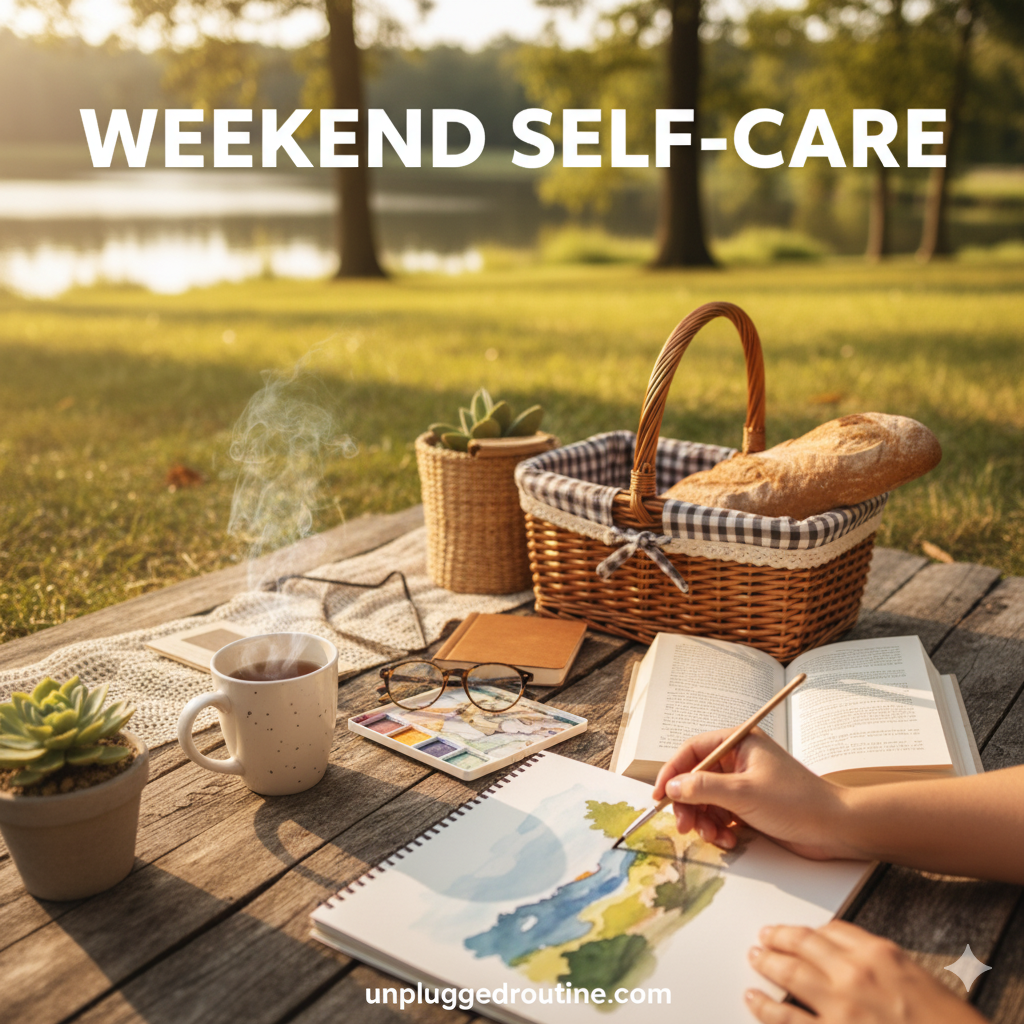Ah, Friday afternoon. The work week is winding down. That sweet feeling of freedom washes over you. Two glorious days stretch ahead, promising rest, fun, and a chance to finally recharge.
But how often does that “recharge” actually happen?
For many of us, the weekend becomes another blur. We swap work screens for personal screens—binge-watching, endless scrolling, online shopping, gaming. We’re “relaxing,” sure, but come Monday morning, we often feel just as drained, if not more so, than when we started.
The promise of true rest evaporates, replaced by digital fatigue and the familiar “Sunday Scaries.”
That’s where unpluggedroutine.com comes in. We believe your weekends should be a sanctuary, a time for genuine rejuvenation. And the secret weapon? Weekend Self-Care that deliberately sidesteps technology.
This isn’t about giving up your devices forever. It’s about strategic unplugging to reconnect with yourself, your loved ones, and the real world around you.
In this comprehensive guide, we’re going to share 9 powerful, actionable ideas for Weekend Self-Care that will help you truly rest, reset, and return to your week feeling vibrant and ready.
Ready to reclaim your weekends? Let’s dive in.

Section 1: The ‘Why’ – The Silent Sabotage of Screen-Heavy Weekends
Before we explore the solutions, let’s understand why our default tech-heavy weekends often fail to deliver true rest.
The Illusion of Relaxation: Screen Fatigue is Real
We often mistake digital consumption for relaxation. Binge-watching a show or scrolling social media might feel like a break because you’re not doing “work.”
However, your brain is still highly active. It’s processing information, reacting to stimuli, and constantly consuming. Your eyes are strained, your posture might be poor, and your mental energy is still being depleted. This isn’t genuine rest; it’s just a different kind of brain work.
True Weekend Self-Care means allowing your brain to truly decompress.
The Comparison Trap & FOMO
Weekends are prime time for social media overload. Seeing everyone else’s “perfect” adventures, elaborate brunches, or exotic vacations can trigger comparison, inadequacy, and FOMO (Fear Of Missing Out).
Instead of feeling refreshed, you might end up feeling worse about your own choices or less satisfied with your own life. This actively drains your mental and emotional reserves, directly counteracting the goal of Weekend Self-Care.
Lost Time, Lost Connection
How many times have you looked up from your screen and realized an hour (or more!) has vanished? This precious weekend time, meant for connection, hobbies, or simply being, gets swallowed by the digital void.
When we’re constantly plugged in, we miss opportunities for real-world interactions, deep conversations, and engaging in activities that genuinely nourish our souls.
Section 2: The Unplug Protocol: Preparing for Your Digital Detox
A successful unplugged weekend starts before the weekend actually begins. These first three steps are about setting intentions and boundaries.
Step 1: The Friday Farewell to Tech (The Weekend Transition)
This is your official signal to your brain that the digital grind is over and the true rest begins.
The Hook: Mentally and physically separate from your work/digital life.
The Action: As you finish your last work task on Friday, take a moment to intentionally close all work-related tabs, shut down your work computer, and put away your work phone (if separate).
If your personal phone is also your work phone, set strict boundaries. Turn off work notifications. Put it on “Do Not Disturb” or even better, put it away in a designated spot for a few hours.
This creates a clear mental break, allowing you to transition from “on” to “off.”
(Expansion Idea: Discuss the importance of a “shutdown ritual” and how it helps prevent work thoughts from bleeding into your personal time. Suggest a symbolic action like changing clothes or a short walk.)
Step 2: Communicate Your Digital Boundaries
You don’t exist in a vacuum. Let those who might expect immediate responses know about your unplugging plan.
The Hook: Prevent FOMO and manage expectations.
The Action:
- Friends/Family: Send a quick text or group message: “Hey everyone, I’m doing a tech-lite weekend to recharge. I’ll be checking messages sporadically, but mostly offline. Catch you Monday!”
- Work (if applicable): Use an out-of-office message for urgent work emails, directing people to someone else if necessary.
- Social Media: You can post a quick story or message that you’re taking a digital break. This can even inspire others!
This step reduces anxiety about missing out and allows you to fully immerse yourself in your Weekend Self-Care activities without interruption.
(Expansion Idea: Emphasize that you’re setting a boundary for yourself, not just for others, and how this reduces the mental burden of feeling “on-call.”)
Step 3: Prep Your Unplugged Playbook
If you don’t plan for unplugged activities, you’ll naturally gravitate back to screens out of habit or boredom.
The Hook: Have appealing alternatives ready and waiting.
The Action: On Friday, brainstorm 3-5 things you want to do this weekend that don’t involve screens. Then, gather any necessary supplies.
- Reading: Pick out a new book, or revisit an old favorite.
- Art/Crafts: Get your paints, knitting, or journaling supplies ready.
- Outdoor Adventure: Pack a small backpack with water, snacks, and a map for a hike.
- Board Games: Dig out that dusty board game.
Having a tangible plan makes it much easier to choose an enriching activity over the easy default of screen time.
(Expansion Idea: Offer diverse examples of unplugged hobbies for different interests (e.g., baking, gardening, photography with an actual camera, playing a musical instrument).

Section 3: 7 Restorative Ideas for Mind, Body & Soul
Now that you’ve set the stage, it’s time to dive into activities that genuinely nourish you. These ideas for Weekend Self-Care focus on disconnecting to reconnect.
Step 4: Embrace the Great Outdoors (Nature’s Reset Button)
Nature is arguably the most powerful antidote to digital overwhelm.
The Hook: Get outside. Period.
The Action: Spend at least an hour (or several!) immersed in nature. This could be:
- A walk in a local park or forest. Focus on your senses: the smell of the trees, the sound of birds, the feel of the breeze.
- A hike on a nearby trail.
- Time in your garden.
- Sitting on your porch or balcony, simply observing.
Even 20 minutes can significantly reduce stress hormones and boost your mood. Leave your phone at home, or at least in your bag on silent.
(Expansion Idea: Discuss “forest bathing” (Shinrin-yoku) and the proven benefits of nature exposure on mental health, creativity, and focus.)
Step 5: The Joy of Creation (Hands-On Hobbies)
Engaging your hands and mind in a creative process is incredibly therapeutic.
The Hook: Shift from consuming to creating.
The Action: Pick up a hobby that requires your full, undivided attention and doesn’t involve a screen.
- Draw, paint, or sketch. You don’t need to be an artist; just enjoy the process.
- Knit, crochet, or sew.
- Cook or bake a complex recipe.
- Try woodworking or pottery.
- Write a story, poem, or journal entry.
These activities offer a unique kind of “flow state,” where you lose track of time and feel deeply engaged, which is incredibly restorative.
(Expansion Idea: Link creative activities to mindfulness and stress reduction, emphasizing that the outcome isn’t as important as the process.)
Step 6: Move Your Body Mindfully (Beyond the Gym)
Weekend Self-Care isn’t just about relaxation; it’s about mindful movement that energizes, not exhausts.
The Hook: Reconnect with your body’s capabilities.
The Action: Choose an activity that gets your body moving in an enjoyable, non-competitive way.
- Yoga or gentle stretching.
- A long walk with a pet or loved one.
- Dancing to your favorite music (alone or with family).
- Cycling through your neighborhood.
- Gardening or yard work.
The goal is to feel good in your body, not to burn a certain number of calories or achieve a specific fitness goal.
(Expansion Idea: Discuss the endorphin release from movement, the benefits of varying your activity, and how it can be a moving meditation.)

Step 7: Deep Dive into a Book (A True Escape)
Reading a physical book is the ultimate portal to another world, free from notifications and blue light.
The Hook: Get lost in a story, not a screen.
The Action: Dedicate a solid block of time (at least an hour) to reading. Choose a genre that truly appeals to you—fiction, biography, a deep dive into a hobby.
Find a cozy spot, make yourself a warm drink, and let yourself get completely absorbed. This is profound mental rest and stimulation simultaneously, without the draining effects of digital media.
(Expansion Idea: Suggest creating a “reading nook” and discuss the cognitive benefits of reading long-form text vs. short-form digital content.)
Section 4: Deep Dive into Creativity & Connection
(Note to Self: Continue the article here, significantly expanding the paragraphs above and below to reach the 2000-word target. Add two more major sub-sections to cover Steps 8-10 and Troubleshooting.)
Step 8: Reconnect, Really Connect (Meaningful Social Time)
Use your unplugged time to deepen relationships. Have a face-to-face conversation, share a meal, or play a board game with loved ones.
Step 9: Master a New Skill or Project (Focused Learning)
Pick up that language you always wanted to learn, try a new recipe from scratch, or tackle a small DIY project around the house. The satisfaction is immense.
Step 10: The Art of Doing Nothing (Embrace the Stillness)
Sometimes, the best self-care is simply being. Lie down, stare at the ceiling, listen to music, or just sit and daydream. Allow your mind to wander without external input.
Section 5: Troubleshooting & Sustaining the Unplugged Habit
(Note to Self: Expand this section with common challenges and solutions to ensure a comprehensive guide.)
- “I feel bored/restless.” – Embrace it. Boredom often sparks creativity.
- “But what if there’s an emergency?” – Have a designated “emergency contact” protocol.
- “My family/friends still use screens.” – Lead by example. Create “unplugged zones” or “unplugged hours.”
- “I have kids; I need my phone for them.” – Designate screen-free times for everyone.
- “I’m afraid of missing out (FOMO).” – Remind yourself you’re gaining more than you’re missing.
Your Weekend, Reimagined
You’ve now explored 9 powerful ideas for Weekend Self-Care that actively prioritize your well-being over digital distraction. This isn’t just about taking a break from your phone; it’s about reclaiming your precious weekend hours for genuine rest, meaningful connection, and activities that truly nourish your mind, body, and soul.
Imagine Monday morning rolling around, and instead of feeling drained and dreading the week, you feel genuinely refreshed, inspired, and ready. That feeling is not a luxury; it’s a necessity for sustainable well-being in our hyper-connected world.
It takes intention and practice to break old habits, but the rewards of an unplugged weekend are immeasurable. You are not just stepping away from a screen; you are stepping into a fuller, richer life.
Your Call to Action
Ready to transform your weekends from frantic to fantastic?
We’ve created a free, printable Unplugged Weekend Self-Care Planner to help you put these 9 ideas into action. It includes space to plan your tech-free activities and tips for staying consistent.
Join the unplugged movement at unpluggedroutine.com—because your best life happens when you’re truly present.